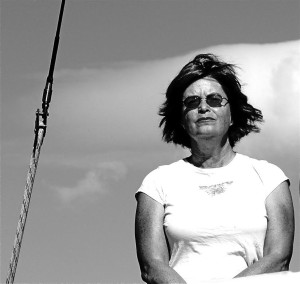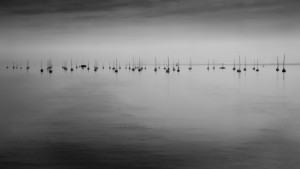Lauren Kettler: Susan, this is a rare treat for me because you and I have been comrades in writing more than a decade now, and our friendship spans even longer than that. I feel privileged to have perused the gamut of your writing, all of it nonfiction and personal. In addition to an array of smaller autobiographical pieces, your manuscript Laughing Goat: A Sailing Memoir chronicles your life cruising the Caribbean with your husband John and daughter Kate. There are so many ways to tell a story. Tell us a little about why memoir and who’s influenced you most in this genre.
Susan Cole: I began writing the story of our three-year voyage a few years after we returned. Our sailing adventure was a transformational experience—leaving our home and roots in Fairfield, Connecticut behind and setting out to sea. I wanted to understand why I went on the voyage and how it changed my life. Two memoirs that influenced me: Abigail Thomas’ Three Dog Life and Lee Martin’s Such a Life. Thomas’ frankness about living with her husband’s brain injury helped me to realize I needed to put myself in the center of the story. I loved Martin’s strong sense of place.
LK: Below is one of my favorite Laughing Goat passages:
“Some time after John moved in, I had a dream in which I was sitting in a crowded train station at night. I was on a bench with other passengers, next to a broad plate glass window that reflected the high arched ceilings and glittering glass chandeliers inside. The window overlooked a busy downtown thoroughfare. Waiting for my train, I was alert yet absorbed in the book I was reading. Suddenly, a giant bare foot crashed through the window and a big laughing bearded man popped through.”
The above is for me a seminal description of John’s footprint, pun entirely intended, on your life. In a smaller piece you said, “Bashert, soul of my soul. I fell into your dream and you awakened mine.” I think more than the cruising, John was the adventure of your life. How did and does his presence continue to shape your writing?
SC: As you know, John died last summer of lung cancer. I wrote “Harbor Lights” about those last months (r.kv.r.y, April issue). John and I were together 44 years. We met at work in our twenties. He was a sailor from Connecticut; I grew up in landlocked Ohio. He talked me into buying a leaky 50’ 1903 Fire Island ferryboat and living in Long Island Sound—our first boat, which later sank. When I met John, I was in psychoanalysis and beginning to come to terms with the deep love I’d had for my dad, who died when I was ten and about whom I never spoke. John burst through my reserves. He had tremendous vitality. He remains my inspiration.
LK: Kate was seven when you and John set sail with her for a cruising life in the Caribbean. You say in your sailing memoir:
“Kate bounded in from her cabin. She showed me a poem she had just written about having to wear shoes again. She stood next to me while I read it, peering over my shoulder. In the poem, she imagined going back to the States and wrote about shoes that pinch, that make you sweat and slow you down. … I realized how much I loved the wildness. I had loved watching her shinny up the mast and seeing her lead children and dogs into crazy tropical adventures where she hadn’t known what the outcome would be. I hadn’t wanted to stuff her or us into tight shoes that pinch– that slow you down.”
What did it mean for you as a woman to take your young daughter on this adventure?
SC: During the voyage, Kate operated the dinghy by herself, swung on the halyard in long graceful arcs over the water from bow to stern, wrote two novels and befriended “boat kids” from around the world. On the other hand, when there were no kids around, she was lonely. Peeking into her cabin one day when she was reading aloud, her stuffed animals arrayed attentively around her, pierced my heart; another time in Belize, when we were stuck on an island waiting for a part, Kate said, “This is no way to raise a child, moving from place to place!” Although I was torn about ripping apart the secure life Kate had in Fairfield, I was glad that she could experience the freedom of blue-water sailing.
LK: A riveting aspect of your sailing memoir is that the places you encounter are as central as the characters themselves:
“I swatted back branches and vines that crept over the dock and screened out the hot afternoon sun. Lizards scurried across the dock and butterflies fluttered in the still air. Something–a bird? an iguana?–clicked from the bushes. On the river, we passed fishermen in cayucos casting their nets. Flocks of birds rose, silhouetted against the pale dawn light. We were back on the Rio Dulce.”
Talk about your seduction with exploring the new and seemingly uncharted.
SC: John and I first read about the Rio Dulce, a lush river in the heart of Guatemala, twenty years before we left on our voyage. The Rio Dulce is a “hurricane hole” where boats take shelter during hurricane season. After arriving at the river, we sailed through a narrow green canyon where red-tailed hawks swooped and spider monkeys raced along the treetops, into an isolated world of boaters thrown together in a remote jungle—grizzled old loners, romantic young single-handers, scammers on the lam and families who crossed oceans to get there. At a dilapidated marina in a lagoon, Kate and I weathered Hurricane Mitch while John was on a business trip in New York. Despite the dangers, the Rio Dulce filled my senses and empowered me.
LK: At one point in the manuscript, you say:
“Yet that time in our lives, the time we had together on Laughing Goat, was like a warm beating heart.”
In your writing, how much of this traversing the seas is the recounting of real life and how much, in your personal journey, is metaphor?
SC: While voyaging, we faced adversity together–a sudden squall, water in the diesel tank, a sheared coupling on the engine shaft. I learned to engage in what was in front of me, to listen and to move quickly. This differed from my life in Connecticut, where I could lose myself for hours (most likely, in depression) after just a phone call from my unstable mother. Learning to navigate the seas helped me navigate other challenges, like John’s cancer.
LK: French writer Francoise Sagan once said, “If I didn’t live well, I couldn’t write well. And if I didn’t write well, I couldn’t live well.” Paraphrase that for yourself.
SC: “I shall write so I may learn to live.”
When Kate was in college, John and I moved aboard Smooch, a catamaran, and sailed between Fort Lauderdale and the Bahamas. After we found out about John’s cancer, we stayed put in Florida so he could get treatment. He remained relatively robust but not strong enough to sail. During those years, I awakened at 4:30 in the morning, made coffee, settled down with our golden retriever at my feet, listened to the water slapping gently against the hull, and worked on the Laughing Goat manuscript. While my actual world involved chemotherapy, surgery and radiation, I imagined myself on Laughing Goat with John and seven-year-old Kate. Remembering my hopes, fears and uncertainties on the voyage, recalling John’s tenacity, helped me through the day-to-day challenges of living with his illness.
LK: So what did you leave out? And what haven’t you written yet?
SC: I attended a writer’s workshop at the University of Iowa two weeks after John died. Although I’ve taken writer’s workshops in Iowa for about ten years, I’m now stunned that I went so soon. I learned in the workshop that while it was too early then, I wanted to write in some way about the experience we had been through during his illness, either in essays or a book. As for what I’ve left out, in nearly every piece of writing, I dabble at the edges of the darkness and dysfunction in my original family. I’ve never tackled it head-on.
Lauren Kettler is a playwright and sometime journalist who moonlights as a copywriter in her day job. Her full-length plays have had readings and/or productions across the country, including “Good Night, Mrs. Bernstein” featured in the OPEN Festival at the 14th Street Y, Manhattan, and “Knock” which took 1st place in both Stage 3 Theatre New Play Festival in Sonora, CA, and the Florida Playwrights Competition. Lauren, an inveterate New Yorker, has been temporarily living in Florida for the past twenty-six years.



Pingback: “Harbor Lights” by Susan Cole | Rkvry Quarterly Literary Journal